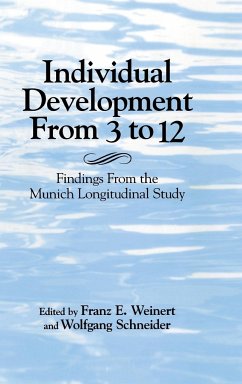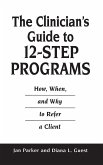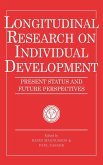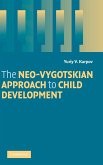Individual Development from 3 to 12
Herausgeber: Weinert, Franz E.; Schneider, Wolfgang
Individual Development from 3 to 12
Herausgeber: Weinert, Franz E.; Schneider, Wolfgang
- Gebundenes Buch
- Merkliste
- Auf die Merkliste
- Bewerten Bewerten
- Teilen
- Produkt teilen
- Produkterinnerung
- Produkterinnerung
This book describes the findings of a longitudinal study conducted with about 200 children from 1984 to 1993. Children were recruited for the study when they had just entered kindergarten at the age of about 4 years. The study aimed to investigate changes in cognitive, social, and personality development over the preschool and elementary school years. One of the unique features of this longitudinal study is that relationships and interactions among cognitive, social, and personality development could be assessed based on the data of a representative sample of children.
Andere Kunden interessierten sich auch für
![The Clinician's Guide to 12-Step Programs The Clinician's Guide to 12-Step Programs]() Diana GuestThe Clinician's Guide to 12-Step Programs87,99 €
Diana GuestThe Clinician's Guide to 12-Step Programs87,99 €![Longitudinal Research on Individual Development Longitudinal Research on Individual Development]() David Magnusson / Paul Casaer (eds.)Longitudinal Research on Individual Development144,99 €
David Magnusson / Paul Casaer (eds.)Longitudinal Research on Individual Development144,99 €![The Neo-Vygotskian Approach to Child Development The Neo-Vygotskian Approach to Child Development]() Yuriy V. KarpovThe Neo-Vygotskian Approach to Child Development107,99 €
Yuriy V. KarpovThe Neo-Vygotskian Approach to Child Development107,99 €![Socioemotional Development and Health from Adolescence to Adulthood Socioemotional Development and Health from Adolescence to Adulthood]() Lea Pulkkinen / Jaakko Kaprio / Richard J. Rose (eds.)Socioemotional Development and Health from Adolescence to Adulthood120,99 €
Lea Pulkkinen / Jaakko Kaprio / Richard J. Rose (eds.)Socioemotional Development and Health from Adolescence to Adulthood120,99 €![Transactions of the Southern Surgical and Gynecological Association; v. 12 (1899) Transactions of the Southern Surgical and Gynecological Association; v. 12 (1899)]() Transactions of the Southern Surgical and Gynecological Association; v. 12 (1899)36,99 €
Transactions of the Southern Surgical and Gynecological Association; v. 12 (1899)36,99 €![The Social Work and K-12 Schools Casebook The Social Work and K-12 Schools Casebook]() The Social Work and K-12 Schools Casebook167,99 €
The Social Work and K-12 Schools Casebook167,99 €![The Social Work and K-12 Schools Casebook The Social Work and K-12 Schools Casebook]() The Social Work and K-12 Schools Casebook55,99 €
The Social Work and K-12 Schools Casebook55,99 €-
-
-
This book describes the findings of a longitudinal study conducted with about 200 children from 1984 to 1993. Children were recruited for the study when they had just entered kindergarten at the age of about 4 years. The study aimed to investigate changes in cognitive, social, and personality development over the preschool and elementary school years. One of the unique features of this longitudinal study is that relationships and interactions among cognitive, social, and personality development could be assessed based on the data of a representative sample of children.
Produktdetails
- Produktdetails
- Verlag: Cambridge University Press
- Seitenzahl: 372
- Erscheinungstermin: 15. April 1999
- Englisch
- Abmessung: 235mm x 157mm x 25mm
- Gewicht: 689g
- ISBN-13: 9780521580427
- ISBN-10: 0521580420
- Artikelnr.: 26931540
- Herstellerkennzeichnung
- Libri GmbH
- Europaallee 1
- 36244 Bad Hersfeld
- gpsr@libri.de
- Verlag: Cambridge University Press
- Seitenzahl: 372
- Erscheinungstermin: 15. April 1999
- Englisch
- Abmessung: 235mm x 157mm x 25mm
- Gewicht: 689g
- ISBN-13: 9780521580427
- ISBN-10: 0521580420
- Artikelnr.: 26931540
- Herstellerkennzeichnung
- Libri GmbH
- Europaallee 1
- 36244 Bad Hersfeld
- gpsr@libri.de
1. Logic: introduction and overview Franz E. Weinert, Wolfgang Schneider,
Jan Stefanek and Angelika Weber; 2. The development of intelligence and
thinking Wolfgang Schneider, Josef Perner, Merry Bullock, Jan Stefanek and
Albert Ziegler; 2a. What individual differences can teach us about
developmental function, and vice versa David F. Bjorklund; 3. Scientific
reasoning: developmental and individual differences Merry Bullock and
Albert Ziegler; 3a. Comments on 'scientific' reasoning: developmental and
individual differences David Klahr; 4. Memory strategy development: gradual
increase, sudden insight, or roller coaster Beate Sodian and Wolfgang
Schneider; 4a. Toward an understanding of the development of memory:
comments on the chapters by Sodian and Schneider and by Weber and Strube;
5. Memory for events experienced and events observed Angelika Weber and
Gerhard Strube; 6. The development of memory for texts Monika Knopf; 6a.
Developmental trends in story recall Walter Kintsch; 7. The impact of early
phonological processing skills on reading and spelling in school: evidence
from the Munich Longitudinal Study Wolfgang Schneider and Jan Carol
Näslund; 7a. Sound logic Peter Bryant; 8. Development of mathematical
competencies Elsbeth Stern; 8a. Commentary on development of mathematical
competencies Susan R. Goldman and James W. Pellegrino; 9. Schooling and the
development of achievement differences Andreas Helmke and Franz C. Weinert;
9a. Schooling and the development of achievement differences Richard E.
Snow; 10. From optimism to realism?: development of children's academic
self-concept from Kindergarten to Grade 6 Andreas Helmke; 10a. The logic
and meaning of declining perceptions of academic competence Deborah Stipek;
11. Social-personality development Jens B. Asendorpf; 11a. Contributions to
knowledge about social-personality development: the Munich Logic Study
Kenneth R. Rubin; 12. The development of moral understanding and moral
motivation Gertrud Nunner-Winkler; 12a. Caring about morality: the
development of moral motivation in Nunner-Winkler's work Augusto Blasi; 13.
A person-centered approach to development: the temporal consistency of
personality and self-concept Marcel A. G. Van Aken and Jens B. Asendorpf;
13a. Regarding 'a person-centered approach to development Jack Block; 14.
Universal, differential and individual aspects of child development from 3
to 12: what can we learn from a comprehensive longitudinal study? Franz E.
Weinert, Merry Bullock and Wolfgang Schneider; References; Index.
Jan Stefanek and Angelika Weber; 2. The development of intelligence and
thinking Wolfgang Schneider, Josef Perner, Merry Bullock, Jan Stefanek and
Albert Ziegler; 2a. What individual differences can teach us about
developmental function, and vice versa David F. Bjorklund; 3. Scientific
reasoning: developmental and individual differences Merry Bullock and
Albert Ziegler; 3a. Comments on 'scientific' reasoning: developmental and
individual differences David Klahr; 4. Memory strategy development: gradual
increase, sudden insight, or roller coaster Beate Sodian and Wolfgang
Schneider; 4a. Toward an understanding of the development of memory:
comments on the chapters by Sodian and Schneider and by Weber and Strube;
5. Memory for events experienced and events observed Angelika Weber and
Gerhard Strube; 6. The development of memory for texts Monika Knopf; 6a.
Developmental trends in story recall Walter Kintsch; 7. The impact of early
phonological processing skills on reading and spelling in school: evidence
from the Munich Longitudinal Study Wolfgang Schneider and Jan Carol
Näslund; 7a. Sound logic Peter Bryant; 8. Development of mathematical
competencies Elsbeth Stern; 8a. Commentary on development of mathematical
competencies Susan R. Goldman and James W. Pellegrino; 9. Schooling and the
development of achievement differences Andreas Helmke and Franz C. Weinert;
9a. Schooling and the development of achievement differences Richard E.
Snow; 10. From optimism to realism?: development of children's academic
self-concept from Kindergarten to Grade 6 Andreas Helmke; 10a. The logic
and meaning of declining perceptions of academic competence Deborah Stipek;
11. Social-personality development Jens B. Asendorpf; 11a. Contributions to
knowledge about social-personality development: the Munich Logic Study
Kenneth R. Rubin; 12. The development of moral understanding and moral
motivation Gertrud Nunner-Winkler; 12a. Caring about morality: the
development of moral motivation in Nunner-Winkler's work Augusto Blasi; 13.
A person-centered approach to development: the temporal consistency of
personality and self-concept Marcel A. G. Van Aken and Jens B. Asendorpf;
13a. Regarding 'a person-centered approach to development Jack Block; 14.
Universal, differential and individual aspects of child development from 3
to 12: what can we learn from a comprehensive longitudinal study? Franz E.
Weinert, Merry Bullock and Wolfgang Schneider; References; Index.
1. Logic: introduction and overview Franz E. Weinert, Wolfgang Schneider,
Jan Stefanek and Angelika Weber; 2. The development of intelligence and
thinking Wolfgang Schneider, Josef Perner, Merry Bullock, Jan Stefanek and
Albert Ziegler; 2a. What individual differences can teach us about
developmental function, and vice versa David F. Bjorklund; 3. Scientific
reasoning: developmental and individual differences Merry Bullock and
Albert Ziegler; 3a. Comments on 'scientific' reasoning: developmental and
individual differences David Klahr; 4. Memory strategy development: gradual
increase, sudden insight, or roller coaster Beate Sodian and Wolfgang
Schneider; 4a. Toward an understanding of the development of memory:
comments on the chapters by Sodian and Schneider and by Weber and Strube;
5. Memory for events experienced and events observed Angelika Weber and
Gerhard Strube; 6. The development of memory for texts Monika Knopf; 6a.
Developmental trends in story recall Walter Kintsch; 7. The impact of early
phonological processing skills on reading and spelling in school: evidence
from the Munich Longitudinal Study Wolfgang Schneider and Jan Carol
Näslund; 7a. Sound logic Peter Bryant; 8. Development of mathematical
competencies Elsbeth Stern; 8a. Commentary on development of mathematical
competencies Susan R. Goldman and James W. Pellegrino; 9. Schooling and the
development of achievement differences Andreas Helmke and Franz C. Weinert;
9a. Schooling and the development of achievement differences Richard E.
Snow; 10. From optimism to realism?: development of children's academic
self-concept from Kindergarten to Grade 6 Andreas Helmke; 10a. The logic
and meaning of declining perceptions of academic competence Deborah Stipek;
11. Social-personality development Jens B. Asendorpf; 11a. Contributions to
knowledge about social-personality development: the Munich Logic Study
Kenneth R. Rubin; 12. The development of moral understanding and moral
motivation Gertrud Nunner-Winkler; 12a. Caring about morality: the
development of moral motivation in Nunner-Winkler's work Augusto Blasi; 13.
A person-centered approach to development: the temporal consistency of
personality and self-concept Marcel A. G. Van Aken and Jens B. Asendorpf;
13a. Regarding 'a person-centered approach to development Jack Block; 14.
Universal, differential and individual aspects of child development from 3
to 12: what can we learn from a comprehensive longitudinal study? Franz E.
Weinert, Merry Bullock and Wolfgang Schneider; References; Index.
Jan Stefanek and Angelika Weber; 2. The development of intelligence and
thinking Wolfgang Schneider, Josef Perner, Merry Bullock, Jan Stefanek and
Albert Ziegler; 2a. What individual differences can teach us about
developmental function, and vice versa David F. Bjorklund; 3. Scientific
reasoning: developmental and individual differences Merry Bullock and
Albert Ziegler; 3a. Comments on 'scientific' reasoning: developmental and
individual differences David Klahr; 4. Memory strategy development: gradual
increase, sudden insight, or roller coaster Beate Sodian and Wolfgang
Schneider; 4a. Toward an understanding of the development of memory:
comments on the chapters by Sodian and Schneider and by Weber and Strube;
5. Memory for events experienced and events observed Angelika Weber and
Gerhard Strube; 6. The development of memory for texts Monika Knopf; 6a.
Developmental trends in story recall Walter Kintsch; 7. The impact of early
phonological processing skills on reading and spelling in school: evidence
from the Munich Longitudinal Study Wolfgang Schneider and Jan Carol
Näslund; 7a. Sound logic Peter Bryant; 8. Development of mathematical
competencies Elsbeth Stern; 8a. Commentary on development of mathematical
competencies Susan R. Goldman and James W. Pellegrino; 9. Schooling and the
development of achievement differences Andreas Helmke and Franz C. Weinert;
9a. Schooling and the development of achievement differences Richard E.
Snow; 10. From optimism to realism?: development of children's academic
self-concept from Kindergarten to Grade 6 Andreas Helmke; 10a. The logic
and meaning of declining perceptions of academic competence Deborah Stipek;
11. Social-personality development Jens B. Asendorpf; 11a. Contributions to
knowledge about social-personality development: the Munich Logic Study
Kenneth R. Rubin; 12. The development of moral understanding and moral
motivation Gertrud Nunner-Winkler; 12a. Caring about morality: the
development of moral motivation in Nunner-Winkler's work Augusto Blasi; 13.
A person-centered approach to development: the temporal consistency of
personality and self-concept Marcel A. G. Van Aken and Jens B. Asendorpf;
13a. Regarding 'a person-centered approach to development Jack Block; 14.
Universal, differential and individual aspects of child development from 3
to 12: what can we learn from a comprehensive longitudinal study? Franz E.
Weinert, Merry Bullock and Wolfgang Schneider; References; Index.








